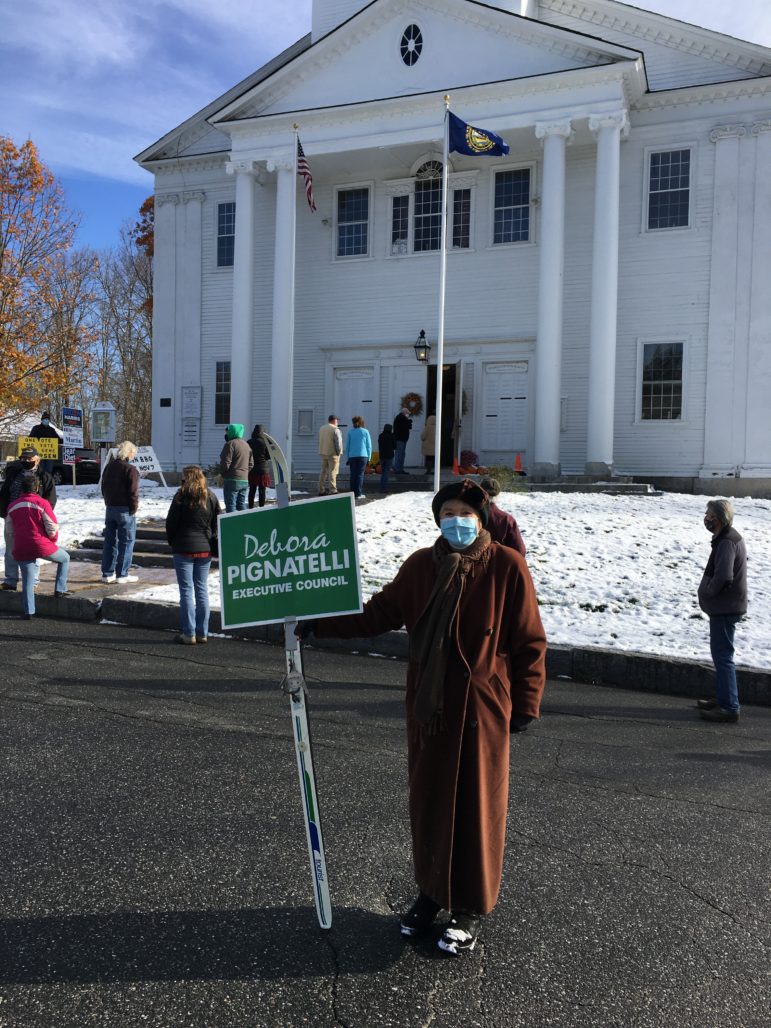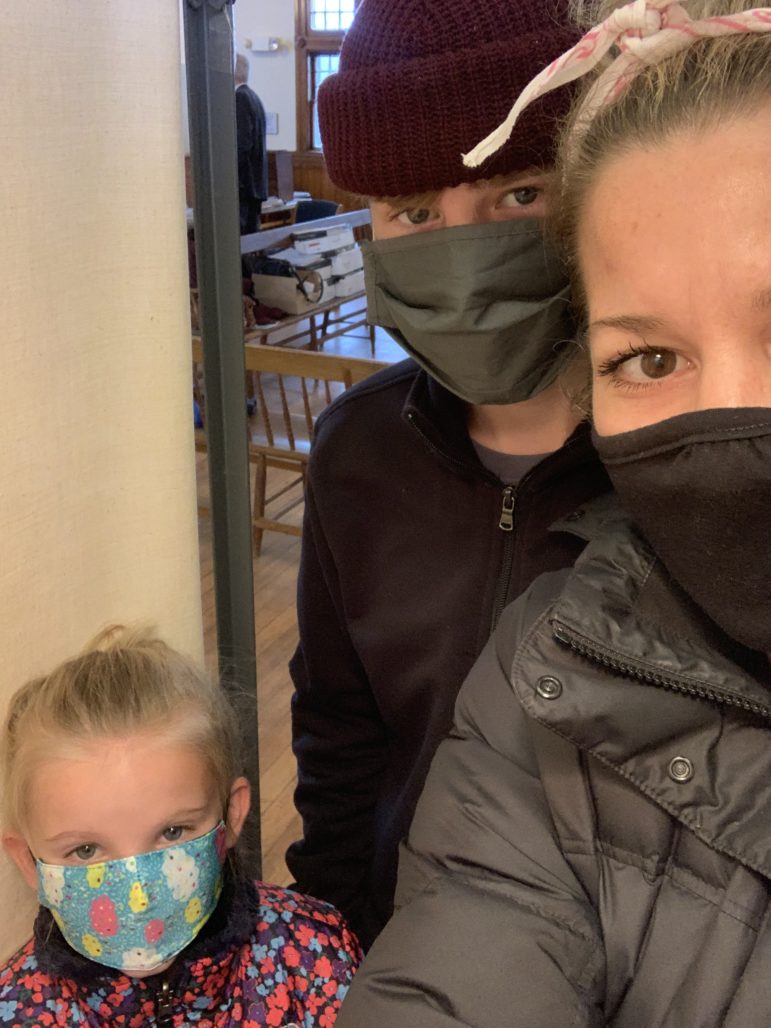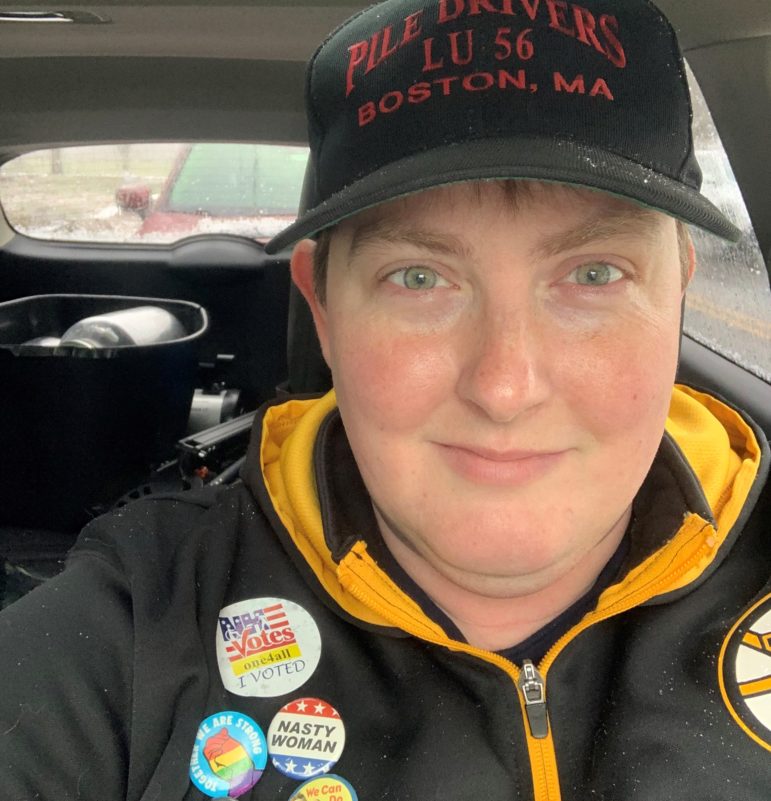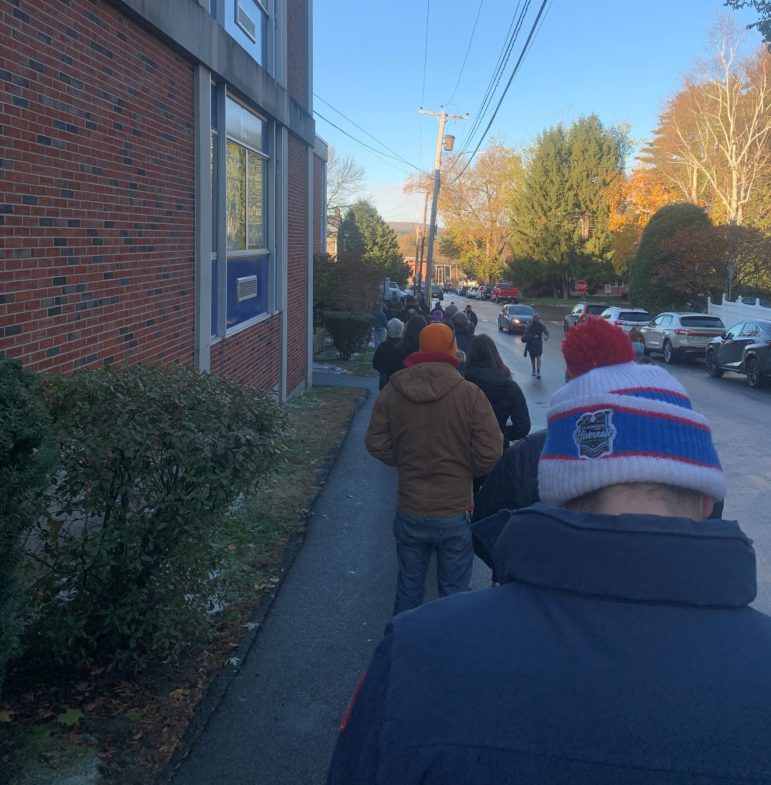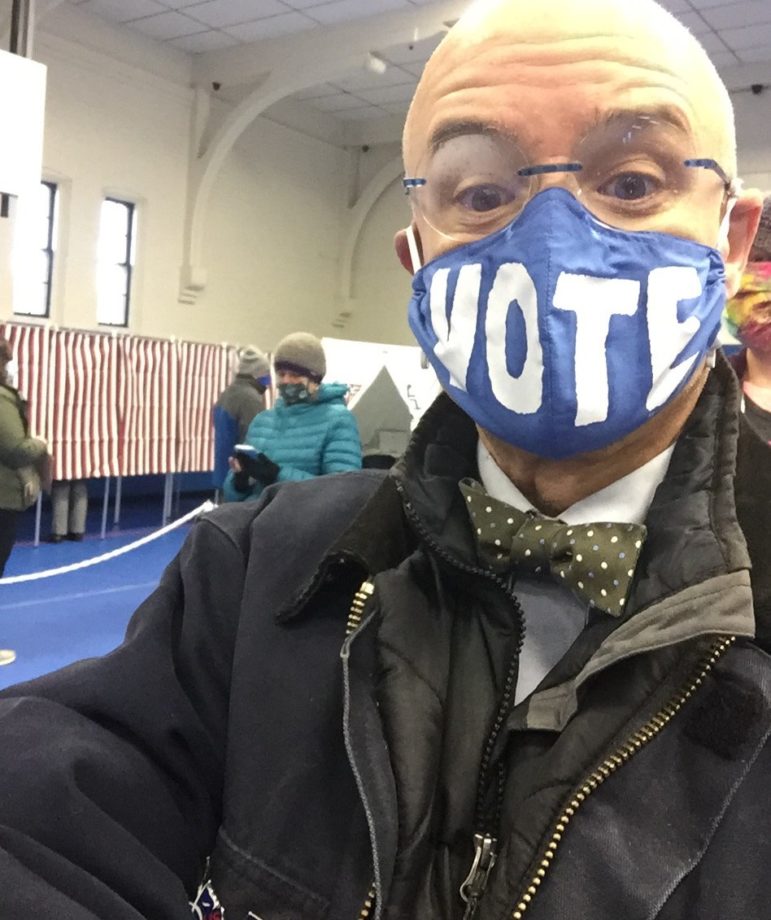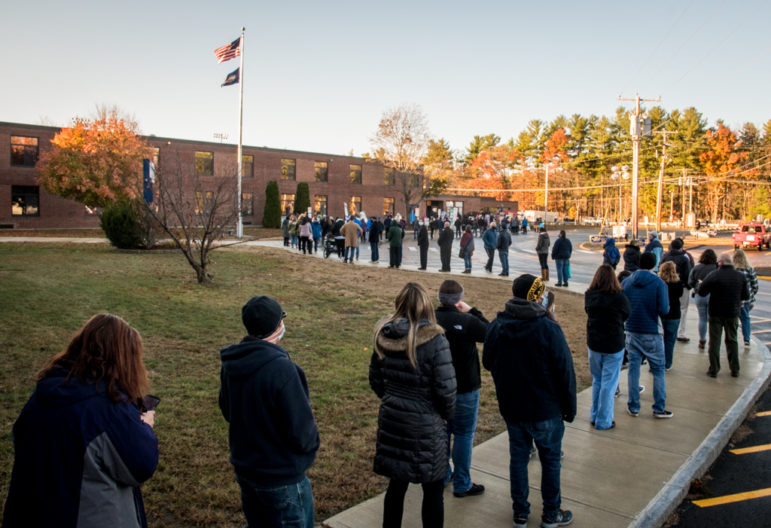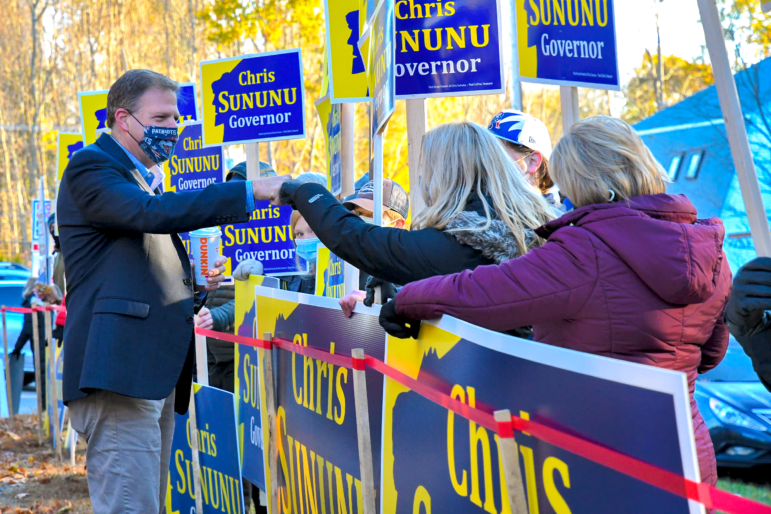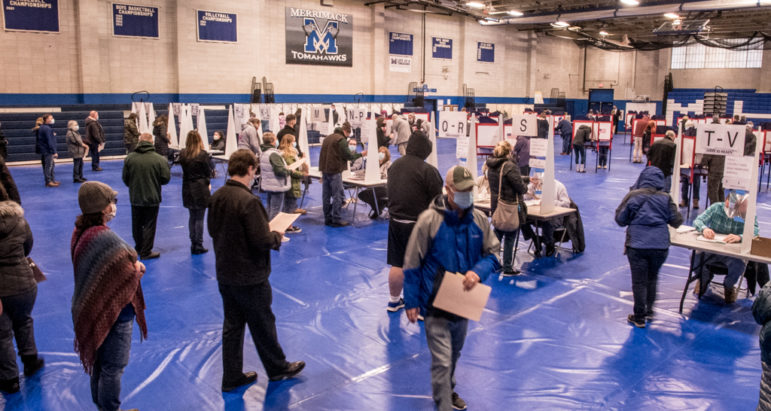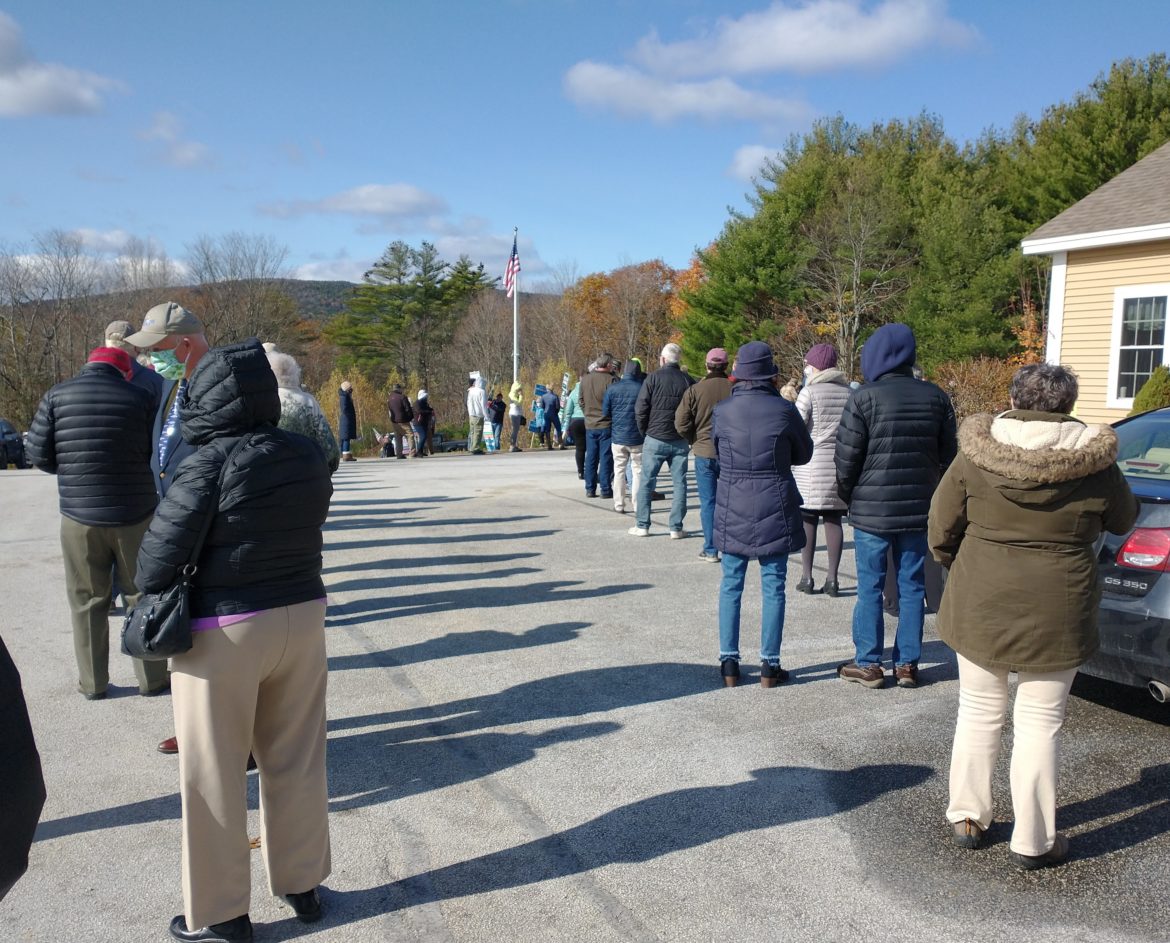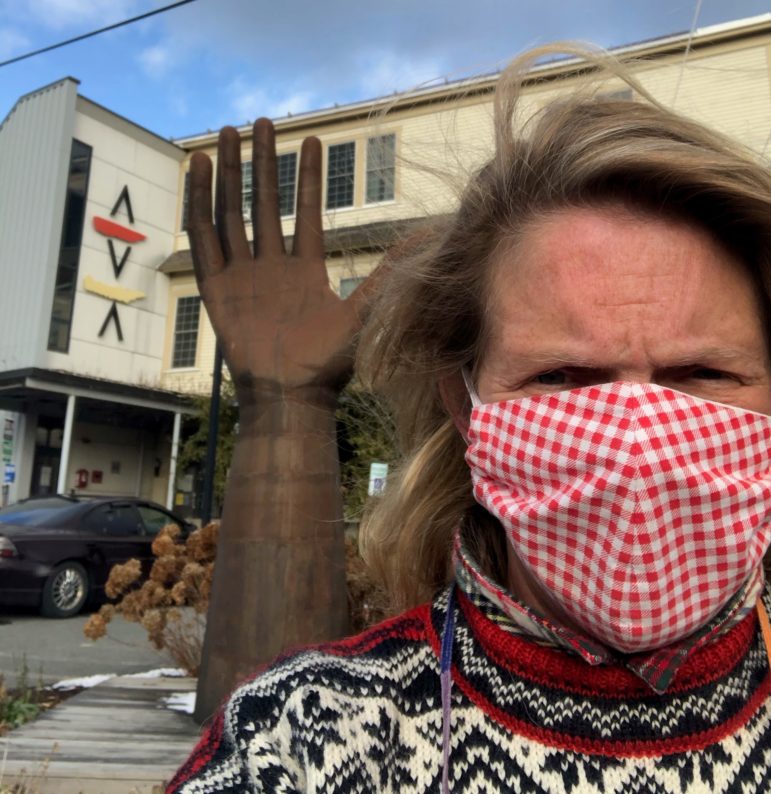
InDepthNH.org will be Out and About with Paula Tracy talking to you today, Nov. 3, 2020. Send your photos to nancywestnews@gmail.com Don’t miss Paula Wednesday morning on NHPR’s The Exchange with Laura Knoy.
By PAULA TRACY, InDepthNH.org
Kim Dube and her husband Victor stood in a long line of voters in North Haverhill, with a steady snow-filled wind blowing her hair about.
Kim, along with her neighbors, stood silently wearing face coverings among close to about 800,000 New Hampshire voters making their mark on a historic 2020 election day.
“I’m here to protect our freedoms and rights,” Kim said, adding while she always votes as a civic duty this day felt different, somehow more important than most elections.
A hundred miles away, in the small town of Enfield, Kim Vazquez exited the polls after expressing surprise at herself for changing her mind behind the red white, and the blue striped curtain of the voting booth.
She flipped from her vote at the last minute after talking with her mother.
“That scared me enough to change my vote,” Vazquez said.
The two women were among many heard has I traveled 150 miles, visited eight polling stations in six hours, sat with cows by the side of the road and spoke with the Secretary of State in Concord, and counted the political signs along Routes 25.
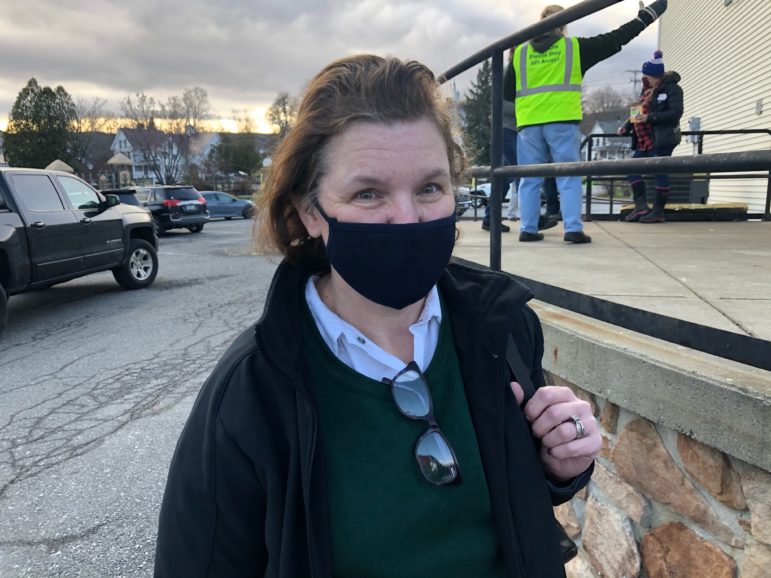
My dog kept me company, and I had a cell phone and charger, a few face masks, a bottle of water for us to share, and a handful of cashews. It was an election day like no election day, and I have covered just about every presidential election day in New Hampshire since 1988.
Ashland
The trip began in Ashland at 10:43 a.m. interviewing 95-year-old Shirley Splaine, who grew up in this small mill town in the center of the state. Her family owned the now-idled Glidden textile mill and she is a bit of a well-known character in these parts.
Splaine, now a resident of neighboring Center Harbor, was among a record number of voters who did not go to the polls this year out of concerns for COVID-19. Instead, she voted by absentee ballot by simply calling her town clerk to ask for ballots for both the September primary and the general election.
In most years, she said, she goes to Ashland not to vote but to sell baked goods to voters and to chat it up with old friends. She said such bake sales are her Ashland church’s primary fundraiser of the year.
“I just think of how much money we would have made today,” if COVID-19 did not prevent the sale at the school, Splaine said.
There were no lines outside at that hour but those working the polls said it was very busy when the doors opened, as was apparently the case across the state.
Splaine said she missed seeing so many of her old friends particularly due to the pandemic “and all the excitement of election day” but she was headed to a doctor’s appointment in Plymouth and would have to hope for better election days to come.
Plymouth
It was 34 degrees and the wind made it hard for Sally Widerstrom of Plymouth to hold on to her political signs outside Plymouth Elementary School about 11 a.m.
She was standing with Chris Mumford, also of Plymouth, in support of a number of Democratic candidates. Widerstrom noted her wife, Joyce Weston, was running for re-election to the state House of Representatives and she was doing her part to see her Democratic candidate win, wind or no wind.
The issue early on was the “wind gusts that were strong and taking our signs like sails,” Widerstrom said. “And we had to take the tent down.”
But Mumford noted the good thing was there were “big crowds” when the doors opened and the line snaked around the outside of the gymnasium entrance.
This year, the election has been “a lot more intense,” Widerstrom said, “trying to understand….why we are not more aligned than we were in previous elections. It’s uncivilized, a lot of the rhetoric, and stressful.” She hopes that after the election everyone will come together.
Rumney
Up along the banks of the Baker River off Route 25 at the Russell Elementary School, a clutch of Democratic sign holders stood together near the road. Sebastian Fuentez of Thornton was eager to talk.
“As Hispanic, Hispanic guys are motivated to get out to the polls because we are an angry community and we want change,” Fuentez said. “I think President (Donald) Trump brought hatred to not just minorities like us but African Americans and Muslims. That is not the American way. That is not the America I signed up for.”
Fuentez said he became a U.S. citizen four years ago and now has three young children. He said he was hopeful for change for their sake.
Stacy Sanborn of the Concord area, who was born and raised in Rumney stood by herself, not far from Fuentez and his group, holding a sign in support of Gail Sanborn who is running for state Representative as a Republican.
Asked how this election year is different than others, she said, “It’s bad.”
“I really don’t have an answer for that. All is fair in love and war we’ll see who wins,” Sanborn said, adding she hopes when the results are tabulated “we will all take it like grown-ups.”
Warren
Heading north along the lumber haul road that connects the mills of New Hampshire to Canada, I visited the Warren Town Hall, next to a Redstone Rocket and a plaque for statesman Norris Cotton.
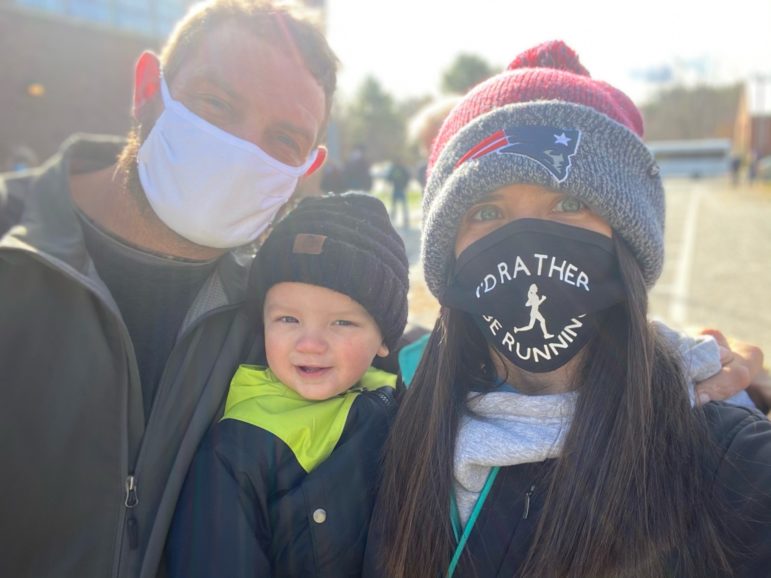
A young mother got out of her station wagon and unstrapped her toddler from the car seat. Asked if she minded answering a question for a reporter, she said yes, she had only had an hour of sleep and was not up to a single question on the election.
This I found to be the case more often than in other years asking voters to talk not necessarily about who they supported but what they felt about the election.
Daniel Dempsy of Warren, however, was more than happy to talk about the Republican candidates he was supporting, including state Sen. Bob Giuda, R-Warren, running against Democrat and Plymouth Selectboard Chair Bill Bolton.
The weather was not a deterrent for his sign-holding. “It was snowing pretty bad earlier,” Dempsy said. He got to the polls an hour before they opened. There was a line of people trying to get in but then the traffic became more steady once the hours passed.
Pointing to his signs he said, “I know these gentlemen, representing our districts in New Hampshire and I support their positions.”
North Haverhill
At about noon, two U.S. combat veterans, Wayne Mitchell, and David Bindford, stood together outside the Haverhill Municipal Building with one holding a Spirit of ’76 flag and a three-point Revolutionary War hat and the other holding signs for Republican candidates.
They said when the polls opened, there was a 45-minute wait in line to get inside but the lunchtime line was comparatively better at about 10 to 20 minutes.
Bill Gardner
Driving south on Route 10 along the Connecticut River toward Hanover at about 1 p.m., I got enough of a cell phone signal just north of Piermont to pull over alongside a field of Black Angus cattle and put in a call to Secretary of State Bill Gardner. He was willing to take my call, and we talked as we have done over the decades and election cycles.
Gardner was just putting on his coat at the State House to head on his rounds to a handful of polling places.
This time, the list was Derry, the largest voting station in the country with 19,000 voters (shortened by about 5,000 absentee ballots) followed by a trip to Ward 3 in Dover, then to Portsmouth, and ending the day in Seabrook.
Gardner is the longest-serving state election leader in the nation. He had predicted a record voter turnout the day before, and he said he was feeling confident that he was on target.
There were no major issues at that hour, Gardner said, noting he was in close contact with the Attorney General and moderators throughout the state, and that any issues were “routine” and likely related to people who refused to wear masks at the polls.
He said that he felt confident that New Hampshire would see a vote similar to the year President John F. Kennedy won when about 78 percent of the voting-age population came out to vote.
“It could be historic,” Gardner said, adding that New Hampshire usually has among the highest voter turnout in the country.
With over 1 million voters before the election, he predicted more than 800,000 ballots cast and said that might be conservative.
The rolls would be increasing by a large number after the election, he said, because the pandemic has made towns like the White Mountain community of Eaton, which still uses an old state-issued ballot box, explode with new residents.
Asked why he was ending the day in Seabrook, Gardner said: “I’ve only been there once.”
One other place on his list, he said, was Manchester’s Ward 2 where he still had yet to vote.
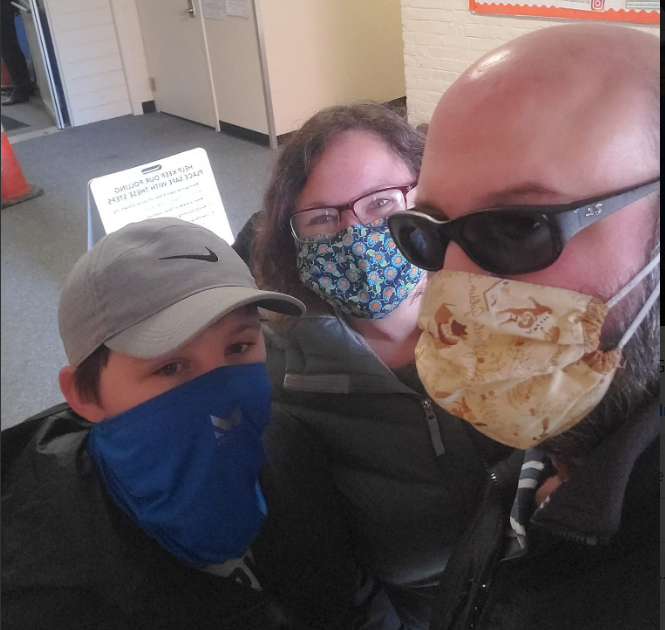
Grafton
In this tiny town between Canaan and Danbury on Route 4, the town hall was busy, but no lines to get in to vote. The weather was bitter cold.
No voters, however, wanted to stop to talk to this reporter about their vote or the experience of voting this year and how it has changed.
Lebanon
At Ward 3 in Lebanon, at the AVA Gallery on Bank Street where a large bronze hand reaches out toward the sky greeted voters, things were going “fantastic,” said Karen Zook, election assistant who was still wired at 2:30 p.m.
The day began with a line around the building at 6:30 a.m. and by midday, more than 170 new voters had registered the same day adding to the rolls of about 3,600.
“New voters are my favorite people,” Zook said. “They keep me excited!”
Several voters came without masks and were offered a separate room where they could vote inside. The door even had a greeter in a mask helping people to the right spot to vote or register.
A uniformed police officer was near the door but off to the side. She said a police presence is customary following an incident several years ago in which a poll worker was assaulted by a voter.
“She’s still here. It wasn’t bad enough to get her to quit,” Zook said, but it was a wake-up call that violence can occur at the polls.
The officer said there was no bump up in the number of officers this year, as was the case in other cities across the state.
Some poll workers in the state had been given de-escalation training to deal with potential conflicts at the polls this year, but it has not yet come to this ward, Zook said.
Normally at 2:30 p.m. as part of a 12-hour day, “we are beat” Zook said, but the tempo and a steady stream of voters were keeping everyone feeling “really great.”
What was different she said, was fewer children accompanying their parents this year. In most cases, she said, people are excited to bring their children to vote, but because of the pandemic “that really isn’t happening this year.”
Another difference from prior years was “a shocking number of absentee ballots” compared to other years. More than 600.
1 p.m. Secretary of State Bill Gardner said based on voting-age population, this might be the highest percentage of voters since the election of John Kennedy with 78 percent of voting-age population voting.
Just before 1 p.m., Gardner said that he was checking in with the Attorney General’s Office hourly and everything seems to be going smoothly.
Gardner was headed to the biggest polling places like Derry with 19,000 eligible voters, where already 5,000 absentee ballots have been cast. Pinkerton Academy had the day off to accommodate voters where 20 police officers were stationed.
